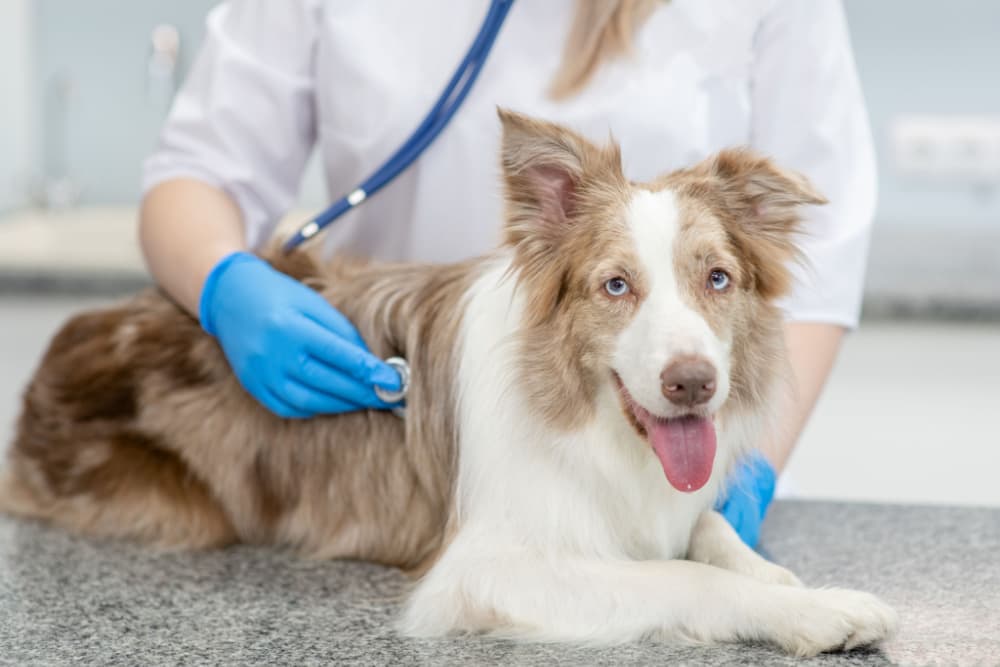Gastritis in Dogs

Overview
Sudden stomach upset that causes vomiting is one of the most common reasons that dogs are seen by a veterinarian, according to insurance records by the ASPCA. That makes sense, as pet parents notice very quickly when their dog isn’t feeling well and seek veterinary attention to stop the symptoms.
Gastritis is a common cause of vomiting in dogs, and in this article, you will learn everything you need to know about this canine stomach condition.
What Is Gastritis in Dogs?
Gastritis is a term used to describe inflammation of the stomach from any cause. Gastritis can have an acute (sudden) onset, or it can be chronic and long term. Chronic inflammation in any bodily organ is bad for your dog’s health, but the risk gastritis poses to your dog’s health depends upon the cause, how severe the inflammation is, and if any other organs are involved.
All dogs are at risk for acute gastritis, however, young dogs that tend to get into garbage or otherwise eat things they shouldn’t are at higher risk for acute gastritis. Older, small-breed dogs, like Shih Tzus, Miniature Poodles, and Lhasa Apsos are more commonly affected by chronic gastritis. In addition, Norwegian Lundehunds, Basenjis, and Drentse Patrijshond dogs are at risk of certain types of chronic gastritis.
What Causes Gastritis in Dogs?

The most common cause of dog gastritis is dietary indiscretion – eating something that doesn’t agree with them and causes their stomach to become inflamed and angry. This may include consuming:
- Garbage
- Dead animals
- High-fat people food
- Plant material
- Toys
- Too many treats or dog food
- Spoiled food
- Irritating chemicals or cleaning agents
- Fertilizers
- Mulch
- Mushrooms
All of this can upset a dog’s stomach and cause gastritis. Dogs that are stressed can also develop gastritis.
Additional causes of gastritis in dogs include:
- Liver or kidney disease, which results in a buildup of toxins in the blood that irritate the stomach
- Stomach cancer
- Addison’s disease, which results in electrolyte imbalances that irritate the stomach
- Inflammation from intestinal parasites
- Certain drugs, like NSAID or steroids, which can irritate and erode the stomach lining, causing stomach ulcers
- Infectious viruses or bacteria that attack the lining of the stomach
- Acid reflux, where stomach acid flows backward from the duodenum into the stomach
- Bilious vomiting syndrome from acid reflux from fasting overnight while sleeping, usually causes vomiting first thing in the morning that is green or yellow foam without food present
- Pancreatitis, which is inflammation of the pancreas that is often associated with inflammation in the gut
- Adverse food reactions (the most common allergens are protein sources like chicken, beef, dairy, egg, or soy)
Gastritis in Dogs: Symptoms and Signs

Signs of gastritis in dogs vary depending on whether the problem is acute or chronic.
Signs of acute gastritis can include:
- Sudden onset of vomiting
- Loss of appetite
- Fever
- Dry gums, sunken eyes, and skin tenting, all signs of dehydration
- Blood in vomit or feces
- Painful abdomen
- Lethargy
- Increased thirst
Acute gastritis is often short in duration, lasting less than 24 hours, and often will resolve on its own.
Signs of chronic gastritis in dogs can include:
- Intermittent vomiting (can range from daily to every few weeks) that may be stained green or yellow from bile, and can contain undigested food, fresh blood, or digested blood that looks like coffee grounds. Vomiting may be stimulated by eating or drinking.
- Loss of appetite that may be intermittent or chronic
- Weight loss associated with chronic loss of appetite
- Increased thirst
- Diarrhea or melena (black stools associated with digested blood) in dogs with concurrent intestinal disease
Chronic gastritis usually does not resolve on its own. If your dog is suffering from chronic gastritis, get help from a veterinarian.
How to Diagnose Gastritis in Dogs

Diagnostics for acute gastritis and chronic gastritis are usually different. Acute gastritis is often self-limiting, which means it often resolves on its own within 24 hours before the dog is seen by a veterinarian. Often, the cause is never determined. If the symptoms don’t resolve within 24 hours, or if the dog is acting sick enough to cause you to be worried, then it’s time to call a veterinarian.
If your dog is suffering from acute gastritis, then your veterinarian will conduct a full physical exam. She will likely ask you about what your dog has recently been eating, or if your dog has any other medical conditions, so be sure to have all the information on hand, including the brand of dog food you feed.
Diagnostic tests may include a fecal test to check for parasites or other abnormalities, blood lab tests, and sometimes X-rays (radiographs) and a urinalysis, but not always.
If your dog is suffering from chronic gastritis, then your veterinary visit may look a bit different. Your vet will still conduct a full physical exam and take a history from you. Diagnostic testing will likely be the same to start (blood lab tests, fecal test, urinalysis, abdominal radiographs) but may also include advanced imaging like abdominal ultrasound, endoscopy and biopsy of the stomach, and specialized testing depending on what your vet thinks is causing the problem.
Treatment for Gastritis in Dogs

Treating Acute Gastritis
Acute gastritis in dogs is typically treated by withholding food for 12-24 hours to rest the stomach, and then feeding small amounts of bland food every 6-8 hours that can either be purchased from your veterinarian or cooked at home until all symptoms resolve. This typically takes 2-3 days. If symptoms do not resolve, schedule an appointment with your veterinarian.
Once symptoms have resolved, then you can slowly transition back to your dog’s regular food by mixing the bland diet with the food for a couple of days. The most typical recipes for bland diets in dogs include boiled chicken breast without skin or spices and either rice or white potato. Lean ground meats or low fat cottage cheese can be substituted for chicken breasts.
Additional treatments may include maropitant, a medication to stop nausea, antibiotics or parasite medication if needed, and fluid therapy if the dog is dehydrated. Getting treatment for acute gastritis is important if it doesn’t resolve quickly, as gastritis is painful, makes your dog feel miserable, and can lead to more serious disease if not addressed. Most dogs respond well to treatment and recover fully.
General cost for treatment of acute gastritis can range from $150-$500, depending on testing, treatment, size of your dog, and your geographic location.
Bilious vomiting syndrome causes gastritis in the early morning usually after fasting all night, and is arguably the most benign cause of chronic vomiting in dogs. This condition can often be managed by simply feeding your dog a small, high protein snack right before bed. If this doesn’t help, ask your veterinarian for a dosage of famotidine (Pepcid) to give your dog at night to reduce stomach acid.
Treating Chronic Gastritis
If your dog is suffering from chronic gastritis from other causes, then treatment depends on resolving the underlying cause if possible. If it’s not possible to treat the underlying cause, managing the symptoms as best as possible can ensure a good quality of life. Treatment may include medication, specialized food, surgery to remove polyps or foreign bodies, or treatment for cancer, if detected.
Medications that may be prescribed for chronic gastritis may include maropitant for nausea, steroids or other immunosuppressive medications for chronic inflammatory conditions, antibiotics like amoxicillin or metronidazole, antacids, or medications such as sucralfate for gastric ulcers.
Foods that might be prescribed for dogs with chronic gastritis are often low-fat and contain a single carbohydrate and protein source. Alternatively, a novel protein or hydrolyzed protein food may be recommended if food allergies are suspected. Frequent (every 4-6 hours), small meals are recommended, and any prescribed diet must be fed for 2-3 weeks to assess how your dog responds.
Cost of testing and treatment for chronic gastritis varies with the underlying cause, and can range from $150-$500 for uncomplicated cases to several thousand dollars for severe or difficult to diagnose and treat cases. Left untreated, gastritis will likely continue to cause pain and weight loss, and may lead to loss of stomach tissue and permanent digestive problems.
In both acute and chronic gastritis, probiotics may be recommended by your veterinarian to treat bacterial imbalances in the gut. Gastritis can be caused by an overgrowth of ‘bad’ bacteria that cause inflammation, and in addition to removing the ‘bad’ bacteria with antibiotics, probiotics can help repopulate the gut with ‘good’ bacteria.
How to Prevent Gastritis in Dogs

Acute gastritis can be prevented by avoiding feeding your dog table scraps, securing garbage or other things your dog might accidentally consume, keeping your dog in a secured yard to prevent free-roaming, and making sure your dog is free of intestinal parasites by having their poop tested every 6 months or using parasite prevention, like Heartgard. Heartgard Plus is a beef chew that prevents heartworm disease and also treats and controls hookworms and roundworms.
Monitor your dog closely for any signs of gastritis if they take NSAIDs for arthritis pain or are on steroids for any reason.
Feed your dog an appropriate complete and balanced diet, have them checked if they show signs of gastritis, and take them to the veterinarian at least once a year for an examination.
